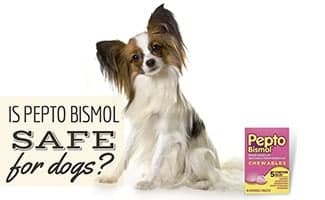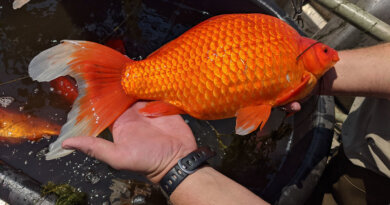Is It Safe, Can You Give It For Diarrhea And Vomiting, And Dosage Chart – CanineJournal.com
 When dogs feel under the weather, some pet parents think an easy fix is to give their pup something from their medicine cabinet. In some cases, you can give dogs human meds, but human meds are usually off-limits for dogs. If your dog is having tummy troubles, you may wonder, can you give a dog Pepto Bismol? Our guide gives you the lowdown on Pepto Bismol and dogs.
When dogs feel under the weather, some pet parents think an easy fix is to give their pup something from their medicine cabinet. In some cases, you can give dogs human meds, but human meds are usually off-limits for dogs. If your dog is having tummy troubles, you may wonder, can you give a dog Pepto Bismol? Our guide gives you the lowdown on Pepto Bismol and dogs.
Article Overview
What Is Pepto Bismol?

Can I Give My Dog Pepto Bismol?
Is Pepto Bismol safe for dogs? Pepto Bismol is generally safe for dogs, but that doesn’t mean you should give it to your pup without first checking with your veterinarian. Never give your pup human over-the-counter (OTC) medications without your vet’s okay. Your vet knows your dog’s medical conditions and health history, so they can determine what is and isn’t safe for your particular pup.
Some veterinary experts are hesitant about recommending Pepto Bismol because the salicylates in the medication could cause gastric bleeding in some dogs. And the bismuth in the medication typically turns dog poop black, making it very difficult to spot any blood in a dog’s stool — a sign that there’s gastric bleeding.
Warning: Never give cats Pepto Bismol or any product containing bismuth subsalicylate. Bismuth subsalicylate is extremely toxic for cats.
What Can Pepto Bismol Treat In Dogs?
Pepto Bismol can help treat your dog’s upset stomach, vomiting, or diarrhea. It can also cause temporary constipation, so if that’s a problem for your pup, you probably shouldn’t give it to him.
What Dogs Should Not Take Pepto Bismol?
When is Pepto Bismol bad for dogs? Pepto Bismol is unsafe for dogs who fall into the categories listed below. Again, always check with your vet before giving your dog Pepto Bismol.
- Dogs with bleeding disorders
- Dogs who are pregnant or nursing
- Dogs who are currently taking antibiotics or aspirin
- Dogs taking non-steroidal anti-inflammatory medications such as Rimadyl and Deramaxx
- Puppies
- Dogs with allergies to the active ingredients (i.e., bismuth subsalicylate)
Pepto Bismol Dosage For Dogs
The following dosage recommendations are for regular strength Pepto Bismol liquid or chewable tablets. Do not give your dog Ultra Pepto Bismol, which is concentrated with twice the amount of bismuth subsalicylate. This 2X concentrate is unsafe for your pup. Also, do not give your dog Pepto Bismol caplets. If you’ve never given your dog Pepto Bismol before, talk to your vet first to make sure it’s safe for your pup.
Liquid Dosage

The best way to give your dog the liquid is to use a plastic syringe. Place the syringe toward the back of your dog’s tongue and slowly push the plunger. Then hold his muzzle to make sure he swallows it.
Liquid Pepto Bismol Dosing Chart
| Dog Weight (Pounds) | Dosage (Teaspoons) |
|---|---|
| 10 | 1 |
| 20 | 2 |
| 30 | 3 |
| 40 | 4 |
| 50 | 5 |
| 60 | 6 |
| 70 | 7 |
| 80 | 8 |
| 90 | 9 |
| 100 | 10 |
Chewable Tablet Dosage
The recommended tablet dosage is 8.5 mg per 1 pound. Keep in mind, this can get difficult to calculate and cut up the tablets to the specific dosage for your dog’s weight. For example, a 20-pound dog would take 65% of one tablet based on this recommended dosage. Here’s a Pepto Bismol tablet dosage chart for dogs to help you figure out how to divide the tablets up based on your dog’s weight.
Tablet Pepto Bismol Dosing Chart
| Dog Weight (Pounds) | Dosage (mg) | Dosage (Tablet*) |
|---|---|---|
| 10 | 85 | 0.30 |
| 20 | 170 | 0.60 |
| 30 | 255 | 1.00 |
| 40 | 340 | 1.30 |
| 50 | 425 | 1.60 |
| 60 | 510 | 2.00 |
| 70 | 595 | 2.25 |
| 80 | 680 | 2.60 |
| 90 | 765 | 3.00 |
| 100 | 850 | 3.25 |
*Based off of a chewable tablet that is 262mg
Frequently Asked Questions
Here are some of the questions our readers ask most often about Pepto Bismol and dogs. If you have another question, ask us in our comment section, and we’ll do our best to help you out.
How Often Can You Give A Dog Pepto Bismol?
If you follow the dosage recommendations above, and your dog isn’t getting better after a few doses, don’t continue giving your dog Pepto Bismol. As we said above, Pepto Bismol has the potential to cause gastric bleeding, so it’s not a good idea to give your dog more than a few doses.
Also, if Pepto Bismol isn’t helping your dog, then your dog may have a more serious digestive issue that needs veterinary care.
Can My Dog Overdose On Pepto Bismol?
If your dog accidentally consumes too much Pepto Bismol, this is a veterinary emergency. In high enough quantities, it can be life-threatening. Contact your vet immediately or go to an emergency vet clinic.
Signs of overdose include:
- Diarrhea or bloody stool
- Vomiting
- Rapid breathing
- Fever
- Weakness, tremors, seizures, or collapse
What If My Dog Ate Pepto Bismol Tablets?
If your dog got into a package of Pepto Bismol tablets, he may very well have eaten a dangerous amount of Pepto Bismol. Seek veterinary care immediately, as this can be life-threatening. See above for the signs of an overdose.
Can You Use Pepto Bismol For Hot Spots On Dogs?
You may have heard that Pepto Bismol is an effective home remedy for reducing hot spot itchiness, but we don’t recommend it. There’s no scientific proof that it helps hot spots. More important, if you slather Pepto on a hot spot, your dog likely will lick it off and could end up overdosing. Learn more about treating hot spots.
Alternatives To Pepto Bismol

Another option to relieve mild stomach upset and diarrhea, as well as constipation, is to give your dog plain pureed pumpkin (with no spices). Mix in ½ to 4 tablespoons, depending on your dog’s size, to your dog’s meal.
For occasional mild stomach issues, vets also often suggest withholding food for 12 to 24 hours and then slowly reintroducing bland food, such as plain cooked rice. But always make sure that you’re keeping your dog hydrated. This is especially important if he’s losing fluids from diarrhea or vomiting.
Learn More About Dog GI Problems
See our articles on dog vomiting, diarrhea, and upset stomachs to learn more about causes, symptoms to look out for, other treatment options, and when it’s time to see your vet. If your dog is experiencing severe vomiting, diarrhea, or other gastrointestinal issues, you should call your vet immediately. Also, if your pup has chronic stomach problems, your vet can help determine the cause. It may require a diet change.
What do you do for your dog’s upset stomach?




